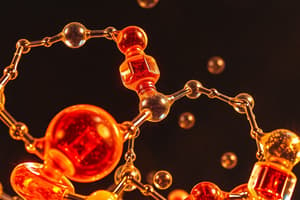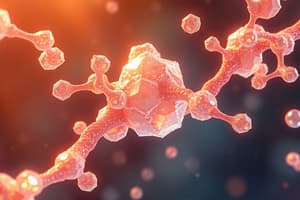Podcast
Questions and Answers
What was the central role described by Lipmann in 1940?
What was the central role described by Lipmann in 1940?
- The structure of DNA
- The role of ATP in biological systems (correct)
- The process of photosynthesis
- The function of enzymes
Which of the following carbohydrates is primarily responsible for storage in plants?
Which of the following carbohydrates is primarily responsible for storage in plants?
- Sucrose
- Cellulose
- Pectins
- Starch (correct)
Which discovery in 1953 significantly advanced the understanding of nucleic acids?
Which discovery in 1953 significantly advanced the understanding of nucleic acids?
- Sequencing of proteins
- Discovery of ATP
- Structure of DNA by Watson and Crick (correct)
- Discovery of DNA polymerase
Which compounds do carbohydrates include as defined by their chemical structure?
Which compounds do carbohydrates include as defined by their chemical structure?
What process led to the emergence of genetic engineering in the 1980s?
What process led to the emergence of genetic engineering in the 1980s?
What significant achievement in biochemistry occurred in 1828?
What significant achievement in biochemistry occurred in 1828?
Who introduced the term 'biochemistry' in 1903?
Who introduced the term 'biochemistry' in 1903?
Which scientist is known for the work on fermentations and the importance of enzymes?
Which scientist is known for the work on fermentations and the importance of enzymes?
What major advancement in enzyme research occurred in 1897?
What major advancement in enzyme research occurred in 1897?
Which pathway was the first metabolic pathway to be elucidated in biochemistry?
Which pathway was the first metabolic pathway to be elucidated in biochemistry?
Flashcards
Biochemistry definition
Biochemistry definition
The study of chemical components in living organisms and how they're used in their life processes.
Urea synthesis
Urea synthesis
Wohler synthesized urea from inorganic compounds. This marked a major step in organic chemistry.
Enzymes and fermentation
Enzymes and fermentation
Pasteur and Buchner showed enzymes, proteins within living cells, are vital in fermentation processes.
Enzyme extraction
Enzyme extraction
Signup and view all the flashcards
Protein nature of enzymes
Protein nature of enzymes
Signup and view all the flashcards
Carbohydrate empirical formula
Carbohydrate empirical formula
Signup and view all the flashcards
Carbohydrate chemical definition
Carbohydrate chemical definition
Signup and view all the flashcards
Carbohydrate importance in plants
Carbohydrate importance in plants
Signup and view all the flashcards
DNA structure discovery year
DNA structure discovery year
Signup and view all the flashcards
ATP's role in biochemistry
ATP's role in biochemistry
Signup and view all the flashcards
Study Notes
Lecture 1: Introduction, Carbohydrates - Importance & Classification
- Biochemistry is the chemistry of living organisms, studying how components are synthesized and utilized.
- Living organisms are primarily made of the same chemical components, bridging conventional chemistry and biology.
- 17th and 18th centuries laid groundwork for biochemistry in various fields.
- 19th century saw developments of cell theory, Mendelian genetics, and Darwin's theory of evolution.
- Wohler's 1828 synthesis of urea from inorganic compounds marked a pivotal moment in biochemistry.
- Pasteur's research on fermentation highlighted the role of enzymes.
- Buchner's 1897 enzyme extraction from yeast demonstrated enzymatic activity, advancing the field.
- Neuberg coined the term "biochemistry" in 1903.
The 20th Century - Advancements
- Early 20th century saw breakthroughs in chemical analysis, separation methods, and instrumentation.
- X-ray diffraction, electron microscopy, and other techniques provided insight into the structures of key biological molecules like proteins, enzymes, DNA and RNA.
- 1926 saw James Sumner's demonstration that enzymes are proteins.
- The elucidation of glycolysis by Embden & Meyerhof and Otto Warburg, and Cori had significant impact in the first half of the 20th century.
- Krebs's described citric acid and urea cycles (1930-40).
- Lipmann described the role of ATP in 1940.
- Watson and Crick's 1953 discovery of DNA structure led to rapid advancements in nucleic acid biochemistry.
- Kornberg's 1956 discovery of DNA polymerase contributed significantly.
Classification of Carbohydrates
- Carbohydrates are one of the major groups of biomolecules.
- They comprise 50-80% of dry plant matter.
- Plants use them for structural material (cellulose) and storage (starch).
- Carbohydrates are also found as components of other molecules in living things.
- These substances contain carbon, hydrogen and oxygen, they may also contain nitrogen, phosphorus, or sulfur.
- Classified into monosaccharides, oligosaccharides, and polysaccharides.
Studying That Suits You
Use AI to generate personalized quizzes and flashcards to suit your learning preferences.




